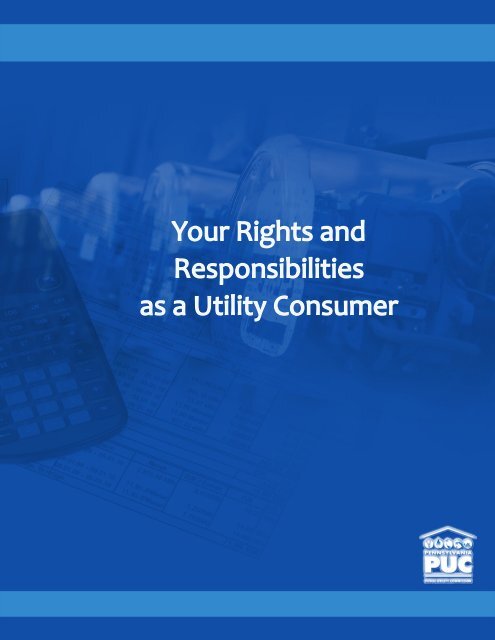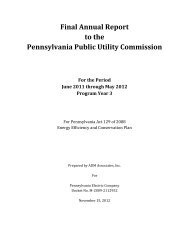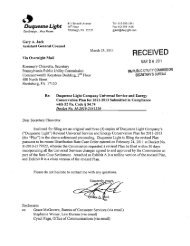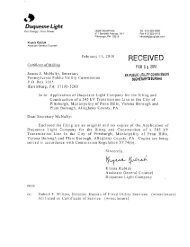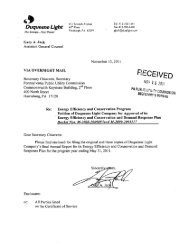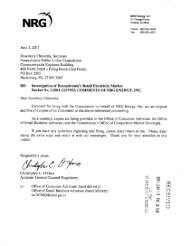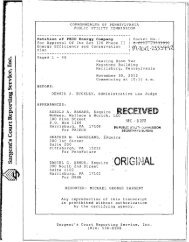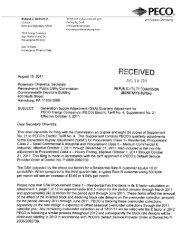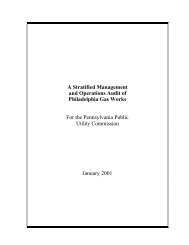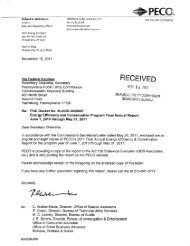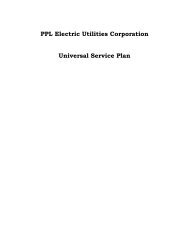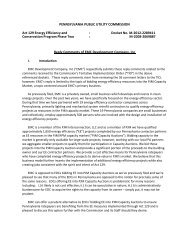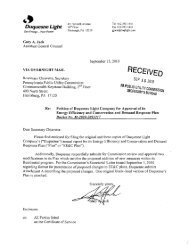Your Rights and Responsibilities as a Utility Consumer
Your Rights and Responsibilities as a Utility Consumer
Your Rights and Responsibilities as a Utility Consumer
You also want an ePaper? Increase the reach of your titles
YUMPU automatically turns print PDFs into web optimized ePapers that Google loves.
<strong>Your</strong><strong>Rights</strong><strong>and</strong><br />
<strong>Responsibilities</strong><br />
<strong>as</strong>a<strong>Utility</strong><strong>Consumer</strong>
The Pennsylvania Public <strong>Utility</strong> Commission (PUC) prepared this guide to summarize<br />
the regulations regarding St<strong>and</strong>ards <strong>and</strong> Billing Practices for Residential Service.<br />
As a residential utility customer, you have many important rights <strong>and</strong> responsibilities to<br />
ensure fair dealings between you <strong>and</strong> your utility company. This guide highlights your rights<br />
relating to your utility’s billing, credit, dispute, <strong>and</strong> shutoff practices.<br />
These rights <strong>and</strong> responsibilities include your right to:<br />
* Safe <strong>and</strong> reliable utility service.<br />
* A clear <strong>and</strong> concise bill.<br />
* Fair credit <strong>and</strong> deposit policies.<br />
You also have the right to:<br />
* Know how your utility bill is calculated.<br />
* Check your utility bill for accuracy.<br />
* Question or disagree with the utility company.<br />
* Receive continuous utility service if you meet your responsibilities.<br />
* Shop for an electric or natural g<strong>as</strong> supplier.<br />
You have the responsibility to:<br />
* Pay your bill on time.<br />
* Provide the utility access to its meter.<br />
* Give the utility at le<strong>as</strong>t 7 days advance notice before you move or wish to have<br />
service discontinued.<br />
You have additional protections outlined in this guide if you:<br />
* Are a victim of domestic violence with a Protection From Abuse Order.<br />
* Live in a low-income household.<br />
* Are seriously ill or a member of the household is seriously ill.<br />
<strong>Your</strong> utility company h<strong>as</strong> the responsibility to honor all of these rights. You, the<br />
customer, should know your rights <strong>and</strong> fulfill your responsibilities to maintain your service.<br />
2
Contents<br />
CALCULATING YOUR UTILITY BILL<br />
The <strong>Utility</strong> Meter <strong>and</strong> Meter Readings ................................................................................5<br />
Estimated Bills .....................................................................................................................5<br />
Supplying <strong>Your</strong> Own Meter Readings .................................................................................6<br />
Checking <strong>Your</strong> <strong>Utility</strong> Bill for Accuracy .............................................................................6<br />
G<strong>as</strong> Cost Rate .......................................................................................................................6<br />
PAYING YOUR UTILITY BILL<br />
When to Pay .........................................................................................................................7<br />
Where to Pay ........................................................................................................................7<br />
Electronic Bill Payment .......................................................................................................7<br />
Billing Errors – Make-up Bills ............................................................................................7<br />
Non-B<strong>as</strong>ic Service Charges .................................................................................................7<br />
Budget Billings – Plan <strong>Your</strong> <strong>Utility</strong> Expenses ....................................................................8<br />
If You Move .........................................................................................................................8<br />
If You’ll Be Away From Home ...........................................................................................8<br />
Third-Party Notification of Shutoff – Extra Protection .......................................................8<br />
If You Have a Protection from Abuse Order .......................................................................9<br />
SECURITY DEPOSITS<br />
Credit Policy for New Customers ........................................................................................9<br />
Credit Policy for Existing Customers ................................................................................10<br />
Satisfying a Security Deposit Request ...............................................................................10<br />
DISAGREEING WITH YOUR UTILITY COMPANY<br />
Questions, Problems <strong>and</strong> Disputes – Get In Touch Immediately ......................................11<br />
Steps to the Dispute Process ..............................................................................................12<br />
Protection from Termination During the Dispute Process .................................................13<br />
CUSTOMER ASSISTANCE PROGRAMS (CAPs)<br />
Programs that Help Low-Income Customers ....................................................................13<br />
UTILITY SHUTOFFS/TERMINATIONS<br />
Payment Agreements .........................................................................................................14<br />
Length of Payment Agreements .........................................................................................14<br />
When <strong>Utility</strong> Service Can Be Shut Off ..............................................................................15<br />
When <strong>Utility</strong> Service Cannot Be Shut Off .........................................................................15<br />
Medical Certifications ........................................................................................................15<br />
Winter Terminations ..........................................................................................................16<br />
The Shutoff Process ...........................................................................................................16<br />
The Restoration Process – Getting <strong>Your</strong> Service Back On ...............................................17<br />
RIGHT TO RESTRICT YOUR PERSONAL INFORMATION ..................................................18<br />
SHOPPING FOR ELECTRICITY/NATURAL GAS ...................................................................18<br />
3
ADDITIONAL INFORMATION CONCERNING<br />
YOUR UTILITY SERVICE ..........................................................................................................18<br />
4
CALCULATING YOUR UTILITY BILL<br />
You have the right to receive a bill for your utility service once every billing period.<br />
Most utilities send bills every month. However, some water <strong>and</strong> sewer utilities send bills once<br />
every two months or once every three months (quarterly).<strong>Your</strong> bill will be b<strong>as</strong>ed on either a<br />
meter reading or an estimate.<br />
If your utility offers an electronic billing program, you may choose to have your bill sent<br />
electronically instead of receiving a paper bill. <strong>Your</strong> electronic bill must include the same<br />
information <strong>as</strong> a paper bill, including bill inserts <strong>and</strong> messages. <strong>Your</strong> utility cannot charge you a<br />
fee for electronic billing. The electronic billing option is voluntary <strong>and</strong> you have the right to<br />
return to paper billing. To return to paper billing, you must make the request to your utility. The<br />
process to return to paper billing may take one billing period.<br />
The <strong>Utility</strong> Meter <strong>and</strong> Meter Readings<br />
If your utility sends you a bill each month, the utility will read your meter at le<strong>as</strong>t every<br />
other month. Some utilities use technology that lets them read your meter automatically. Others<br />
send meter readers <strong>and</strong> utility service personnel to visit your residence to get a meter reading.<br />
Meter readers <strong>and</strong> utility service personnel will carry identification, which you should <strong>as</strong>k to see<br />
for your protection. Ple<strong>as</strong>e call your utility immediately if you have questions about the identity<br />
of an employee.<br />
The meter is the property of your utility company. It is illegal for you to remove the<br />
meter or tamper with it. You have the responsibility to give the utility access to the meter in<br />
order to read it <strong>and</strong> maintain it. You must make the meter accessible by keeping it free from<br />
obstructions that the utility person may encounter at your residence. If you have a pet, you<br />
should restrain it. If there are obstacles in the way, you should remove them.<br />
Estimated Bills<br />
Utilities that bill monthly may estimate your usage every other month. <strong>Your</strong> bill may<br />
also be estimated when extreme weather conditions, emergencies, strikes, or other circumstances<br />
prevent the company from taking an actual meter reading. The estimate is b<strong>as</strong>ed on your<br />
previous usage through previous meter readings <strong>and</strong> may be adjusted for existing weather<br />
conditions.<br />
<strong>Your</strong> utility bill also may be estimated when the meter reader cannot gain access to your<br />
meter. When this happens, the utility company still h<strong>as</strong> the responsibility to take an actual meter<br />
reading at le<strong>as</strong>t once every six months unless you supply your own meter readings. If you supply<br />
the readings, the utility h<strong>as</strong> the responsibility to take an actual reading every 12 months. You<br />
<strong>and</strong> the company have the responsibility to make arrangements for meter readings if the meter is<br />
in a locked place. If your bill h<strong>as</strong> been estimated for several months, your actual bill may be<br />
incre<strong>as</strong>ed or decre<strong>as</strong>ed according to the usage indicated by the actual meter reading.<br />
5
Supplying <strong>Your</strong> Own Meter Readings<br />
If you would like all your bills to be b<strong>as</strong>ed on actual meter readings instead of estimates,<br />
you may supply the utility with readings during estimated billing periods. Some utilities let you<br />
give them your meter reading by telephone or through their website. You may also <strong>as</strong>k for meter<br />
reading cards from the utility <strong>and</strong> return them by the date listed on the card. Contact your utility<br />
for more details. The utility will also provide you with meter reading instructions.<br />
Checking <strong>Your</strong> <strong>Utility</strong> Bill for Accuracy<br />
If you think that your utility bill is wrong, you can check it in the following ways:<br />
Read your meter if you question the amount of service you have used <strong>and</strong> compare the<br />
meter reading to the meter reading that is on your bill. <strong>Your</strong> usage will have incre<strong>as</strong>ed between<br />
the time the utility read your meter <strong>and</strong> when you take the reading. For this re<strong>as</strong>on, your reading<br />
may be somewhat higher than the reading listed on your bill.<br />
Compare the usage on the current bill to one you received at the same time l<strong>as</strong>t year.<br />
Remember to compare differences in usage rather than differences in the total dollar amount due.<br />
<strong>Your</strong> bill may even have a bar chart that compares usage for the p<strong>as</strong>t 13 months. Remember to<br />
consider severe weather conditions <strong>and</strong> changes in living habits (such <strong>as</strong> additions to your house,<br />
a new appliance, additional family members, or more time spent at home) when comparing your<br />
usage information.<br />
Contact the utility immediately with any additional questions about your bill.<br />
G<strong>as</strong> Cost Rate<br />
Most local natural g<strong>as</strong> utilities are required to provide reliable natural g<strong>as</strong> service at the<br />
le<strong>as</strong>t possible cost. The mechanism used to determine this is the purch<strong>as</strong>ed g<strong>as</strong> cost rate. Because<br />
the natural g<strong>as</strong> markets fluctuate, the natural g<strong>as</strong> companies must file their purch<strong>as</strong>ed g<strong>as</strong> cost<br />
rate quarterly at which time the company can make adjustments to the rate being charged to you<br />
to reflect the price the utility paid for the natural g<strong>as</strong>. By law, the utility cannot make a profit by<br />
charging consumers more than what it pays for the natural g<strong>as</strong>, but rather, it must be a dollar-fordollar<br />
p<strong>as</strong>s through of costs. If any over-collections occur, the amount will be reflected in your<br />
future bills.<br />
Natural g<strong>as</strong> utility companies are audited annually by the PUC to ensure the purch<strong>as</strong>ed<br />
g<strong>as</strong> cost rate being p<strong>as</strong>sed on to the consumers reflects the costs paid by the utility <strong>and</strong> that every<br />
effort w<strong>as</strong> made to purch<strong>as</strong>e the g<strong>as</strong> for the le<strong>as</strong>t possible price.<br />
6
PAYING YOUR UTILITY BILL<br />
When to Pay<br />
You must make every effort to pay your bill by its due date. After the bill is mailed, you<br />
have 20 days to pay it. If you do not pay the bill by its due date, you may be charged a late fee<br />
on the unpaid overdue balance. Late fees cannot be more than 1.5 percent per month or greater<br />
than 18 percent simple interest per year. If you do not pay your bill on time, the utility may<br />
pursue collection activity or termination of service.<br />
Where to Pay<br />
You may either mail the payment; pay your bill at “authorized” locations chosen by your<br />
utility, including some utility customer service offices; or pay online. By calling the utility, you<br />
also may receive other payment options. Check your utility company’s website for “authorized”<br />
payment locations <strong>and</strong> information about acceptable ways to pay. The utility is not responsible<br />
for any lost payments made to an unauthorized agent.<br />
Electronic Bill Payment<br />
<strong>Your</strong> utility may offer an electronic bill payment program. If the bill payment is made<br />
through an automatic charge to your credit card or an automatic withdrawal from your bank<br />
account, you have the right to know when the automatic payment will be made – either the<br />
number of days after the bill is issued or the actual date. <strong>Your</strong> utility cannot require you to enroll<br />
in an electronic payment program even if you choose to receive your bill electronically.<br />
Billing Errors – Make-Up Bills<br />
Sometimes billing errors occur. These mistakes could be caused by a utility company<br />
billing error or a number of low or high estimated bills. The utility must refund or credit your<br />
account with any over-collected amounts resulting from this mistake. Likewise, if you have used<br />
more electric, g<strong>as</strong> or water service than the amount you were billed, you must pay the additional<br />
charge to the utility. However, the utility company must explain this “make-up” bill. You do<br />
not have to pay this amount in a lump sum. You can pay it back over a period of time that is<br />
equal to the time period during which the mistake occurred. Ple<strong>as</strong>e call your utility to make<br />
appropriate payment arrangements.<br />
Non-B<strong>as</strong>ic Service Charges<br />
A utility company may put a charge for a non-b<strong>as</strong>ic service on your bill. However, the<br />
utility must present this charge clearly <strong>and</strong> separately on your bill. Some examples of these nonb<strong>as</strong>ic<br />
charges are: merch<strong>and</strong>ise, appliances, installation fees, sales, rental or repair costs, meter<br />
testing fees, line extension costs, special construction charges, <strong>and</strong> warranty programs.<br />
7
Budget Billing – Plan <strong>Your</strong> <strong>Utility</strong> Expenses<br />
<strong>Your</strong> electric or g<strong>as</strong> utility must offer budget billing on a year-round enrollment b<strong>as</strong>is.<br />
You have the right to request budget billing from the utility company. Budget billing is an<br />
agreement you make with the company to have your bills averaged throughout the year.<br />
Adjustments to your bill <strong>as</strong> a result of this averaging may occur periodically throughout the year.<br />
The company will review <strong>and</strong> adjust the amount of your budget bill b<strong>as</strong>ed on your usage. You<br />
will be billed for approximately the same amount each month even though your usage may vary<br />
from se<strong>as</strong>on to se<strong>as</strong>on. At the end of your budget year, if you must pay a large amount to settle<br />
the difference from what you actually used, you can <strong>as</strong>k the company to spread the amount over<br />
a period of time.<br />
If you do not pay your monthly budget amount on time, your utility may remove you<br />
from budget billing.<br />
The budget billing program may make it e<strong>as</strong>ier for you to plan your utility expenses. The<br />
utility will provide you with more information about its programs.<br />
If You Move<br />
If you plan to move, you have the responsibility to notify the utility at le<strong>as</strong>t 7 days before<br />
your moving date to have service discontinued. If you fail to notify the company, you may have<br />
to pay for service at your old address even after you move. Even though you move, you are still<br />
responsible to pay any utility bill you still owe at your old address. It would be helpful to keep<br />
documentation that you notified the utility, either by making a copy of the letter sent to the utility<br />
or by writing down the date, time <strong>and</strong> name of the utility company representative you notified.<br />
You also have the responsibility of giving the company access to your meter for a final<br />
reading <strong>and</strong> shutoff. If you cannot or do not provide access to your meter at the time you want<br />
your service shut off, the utility may finalize your account b<strong>as</strong>ed on an estimate. The utility h<strong>as</strong><br />
the right to issue a revised bill if an actual meter reading later shows the estimate w<strong>as</strong> incorrect.<br />
If You’ll Be Away From Home<br />
If you plan to be away from home for a long period of time, you have the responsibility<br />
to make arrangements for paying your bills <strong>and</strong> ensuring access to the utility’s meter.<br />
Remember, your utility service continues even while you are away <strong>and</strong> you will be billed during<br />
your absence. <strong>Your</strong> failure to make arrangements for payment of these bills could result in the<br />
shutoff (termination) of your service.<br />
Third-Party Notification of Shutoff – Extra Protection<br />
The third-party notification program gives added protection against utility service<br />
shutoff. This program protects individuals who may either be away from home for an extended<br />
time period or those who may not underst<strong>and</strong> the utility company’s practices.<br />
8
The third-party notification program lets you choose another person to receive copies of<br />
shutoff or termination notices your utility sends you for any re<strong>as</strong>on.<br />
By filling out a form, you permit the utility to send these notices to a third party that you<br />
choose. In this way, another individual (e.g., family member or close friend) is made aware of<br />
an important problem. Perhaps this person can provide you with advice or <strong>as</strong>sistance. This third<br />
party does not have the responsibility for paying your bills!<br />
You may obtain forms <strong>and</strong> further information concerning this program by calling the<br />
utility, or by visiting your utility company’s website.<br />
If You Have a Protection from Abuse Order<br />
If you are a victim of abuse <strong>and</strong> have a Protection from Abuse (PFA) order issued by the<br />
courts, special procedures <strong>and</strong> protections exist for h<strong>and</strong>ling your concerns regarding your utility<br />
service.<br />
Some of these protections include:<br />
* <strong>Your</strong> service cannot be turned off during the winter without approval from the PUC.<br />
* Depending on your income, a special payment arrangement may be available.<br />
* <strong>Your</strong> service cannot be terminated the day before a weekend or holiday.<br />
* You may not be held responsible for a bill in someone else’s name.<br />
* You may not be required to pay a security deposit. If you are required to pay a security<br />
deposit, you may qualify to spread the amount due over three payments.<br />
Call your utility company to inform them about your PFA so these special procedures <strong>and</strong><br />
protections can be provided. <strong>Your</strong> utility company may require you to provide them with a copy<br />
of your PFA order.<br />
SECURITY DEPOSITS<br />
Security deposit decisions must be b<strong>as</strong>ed only on your individual credit record. The<br />
utility cannot require a deposit on the b<strong>as</strong>is of where you live, your race, sex, age if over 18,<br />
national origin, or marital status.<br />
Credit Policy for New Customers<br />
When you apply for new utility service, the utility company h<strong>as</strong> the right to check your<br />
credit history <strong>and</strong> level of credit risk to determine whether a security deposit is necessary. The<br />
utility may <strong>as</strong>k you for your social security number in order to check your credit history, but<br />
cannot require you to provide your social security number. The utility can <strong>as</strong>k for valid<br />
identification (ID) which may be a government issued photo ID or two alternative IDs <strong>as</strong> long <strong>as</strong><br />
9
one h<strong>as</strong> a photo. The utility may also require you to provide the names <strong>and</strong> proof of identity of<br />
each adult occupant of the residence.<br />
The utility company can charge you a deposit <strong>as</strong> a new customer if you:<br />
* Were previously a customer of the public utility <strong>and</strong> either your service w<strong>as</strong><br />
involuntarily terminated or you have a previously unpaid balance.<br />
* Cannot p<strong>as</strong>s the utility company’s credit scoring <strong>as</strong>sessment.<br />
The utility company must notify you in writing of the specific re<strong>as</strong>ons why you are<br />
required to pay a security deposit. If the utility company takes longer than three business days to<br />
check your credit, it must provide you with service until the deposit decision is made. You also<br />
have the right to furnish a third-party guarantor instead of paying a c<strong>as</strong>h deposit.<br />
If you are a low-income consumer applying for or already participating in a utility<br />
Customer Assistance Program, the utility may waive or forgive the need for a deposit.<br />
In addition, before providing service the utility may require that you pay any unpaid bills<br />
that you owe to the utility from the l<strong>as</strong>t four years. The utility may require you to pay even if<br />
you were not the customer of record. If you resided at the residence for which service is<br />
requested when the unpaid bills accumulated, the utility may require you to pay those bills. The<br />
utility may allow you to make a payment agreement to pay the amount you owe. If you did not<br />
live at the residence, the utility cannot hold you responsible for another person’s unpaid bills.<br />
The utility may <strong>as</strong>k you to provide additional proof to show that you did not live at the residence.<br />
Credit Policy for Existing Customers<br />
you:<br />
The utility company may require a security deposit from you <strong>as</strong> an existing customer if<br />
* Have not paid your utility bills on time. That is, you have been late in paying<br />
two bills in a row or three or more bills in the l<strong>as</strong>t year.<br />
* Have failed to make payments according to a payment schedule set up to pay<br />
p<strong>as</strong>t-due bills.<br />
* Have had service shut off because of unpaid bills.<br />
Satisfying a Security Deposit Request<br />
You may satisfy the utility company’s request for the deposit by doing either one of the<br />
following two options:<br />
Paying a C<strong>as</strong>h Deposit. The amount of the deposit cannot be greater than two months of<br />
your estimated usage. Applicants who seek to reconnect service after being terminated have the<br />
10
option to pay this deposit in three payments: 50 percent immediately, 25 percent at the end of 30<br />
days, <strong>and</strong> 25 percent at the end of 60 days.<br />
Existing customers who have been delinquent in payment on their account also have the<br />
option of paying the deposit in installments. Existing customers have 20 days after notification<br />
by the utility company to make the first payment.<br />
All other applicants or customers may be required to pay this deposit in a lump sum upon<br />
request. Applicants for <strong>and</strong> participants in the utility Customer Assistance Program may be<br />
subject to different deposit amounts <strong>and</strong> should confirm that amount with the utility.<br />
Supplying a Third-Party Guarantor. Instead of paying a c<strong>as</strong>h deposit you can have<br />
another credit-worthy person sign a form guaranteeing that your bills will be paid. If you miss a<br />
payment, this person is responsible for paying all missed payments owed to the utility. The<br />
guarantor must be able to establish credit by showing an account with a timely payment history<br />
that contains no prior service terminations or by p<strong>as</strong>sing the utility’s credit scoring <strong>as</strong>sessment.<br />
Establishing a timely payment history<br />
A utility may hold a deposit until a timely payment history is established or for a<br />
maximum period of 24 months. A timely payment history is established when a customer h<strong>as</strong><br />
paid in full <strong>and</strong> on time for 12 consecutive months. This deposit earns interest.<br />
DISAGREEING WITH YOUR UTILITY COMPANY<br />
You have the right to question or dispute any billing or service action of the utility<br />
company. You should tell the company of the problem <strong>as</strong> soon <strong>as</strong> it occurs. This gives the<br />
utility the opportunity to resolve the matter with you. If you do not contact the utility first, the<br />
Commission may instruct you to do so before accepting an informal complaint from you.<br />
Questions, Problems <strong>and</strong> Disputes – Get In Touch Immediately with <strong>Your</strong> <strong>Utility</strong><br />
You may question any charge applied to your bill, <strong>as</strong>k about the company’s billing<br />
policies or services, request new service, complain about present service or make a payment<br />
agreement for your bills. <strong>Your</strong> concerns or questions can often be best answered if you<br />
immediately bring them to your utility company’s attention. <strong>Your</strong> utility company may <strong>as</strong>k you<br />
to allow it to review its records about your concern <strong>and</strong> call you back. If you agree to let the<br />
company do this, the utility company will call you back with the results of its investigation. If<br />
the company cannot reach you, it will send you a letter that will tell you what it found from its<br />
review.<br />
If you are not satisfied or disagree with the utility company’s response, tell the company<br />
that the matter is not resolved to your satisfaction. You may do this in writing or by notifying<br />
11
the company representative by phone. At this point, the inquiry you make to the utility company<br />
becomes a dispute.<br />
Steps of the Dispute Process<br />
Here are the steps of the dispute process, which must be followed in the order in which<br />
they are listed below:<br />
Step 1. Filing a Dispute with the <strong>Utility</strong> Company.<br />
After you have indicated that you are not satisfied with the company’s resolution of your<br />
inquiry, the company must respond to your dispute within 30 days. In answering your dispute,<br />
the company must provide you with all the information necessary for you to make a decision on<br />
whether you need to proceed further with the matter. This includes informing you of all related<br />
company rules (tariffs). The utility company can also provide you with a statement of your<br />
account including payments <strong>and</strong> meter readings. Meter test results <strong>and</strong> any other information<br />
related to your dispute should also be included when appropriate. In addition, the company must<br />
tell you of your right to register a further complaint with the PUC <strong>and</strong> how to do this. The<br />
utility must make the written utility company report available to you upon request.<br />
Step 2. Filing an Informal Complaint with the PUC.<br />
You must first contact your utility company if you have questions or concerns. If you do<br />
not agree with the company’s response to your concerns, you may file an informal complaint<br />
with the PUC within 10 days of notification or mailing of a utility company report (in order to<br />
maintain utility service while you appeal). You may still file an informal complaint after 10 days,<br />
but if you have a pending shutoff notice, you may be waiving your right to keep your service on<br />
while your dispute is pending. Write or call the PUC’s Bureau of <strong>Consumer</strong> Services for<br />
<strong>as</strong>sistance (see l<strong>as</strong>t page of this guide for contact information). To look into your complaint, the<br />
Bureau will need the following information regarding the account your complaint involves:<br />
Name;<br />
Telephone number;<br />
Service address;<br />
Account number;<br />
Name of the utility;<br />
Description of the problem <strong>and</strong> what action the utility company took;<br />
Request for action you are seeking.<br />
The Bureau of <strong>Consumer</strong> Services’ staff will review the matter <strong>and</strong> investigate further.<br />
They will make a decision b<strong>as</strong>ed upon the facts both you <strong>and</strong> the company present.<br />
12
The Bureau will notify you of its decision <strong>and</strong> at the same time explain the steps involved<br />
in appealing this decision to the PUC if you disagree with it. You may request a written report of<br />
the Bureau’s decision.<br />
Step 3. Filing a Formal Complaint.<br />
If you disagree with the Bureau of <strong>Consumer</strong> Services’ staff decision, you have the<br />
option to appeal that decision within 20 days from the date you received notification or mailing<br />
of the Bureau’s informal complaint report (in order to maintain utility service while you appeal).<br />
You may still file a formal complaint after these 20 days, but if you have a pending shutoff<br />
notice, you may be waiving your right to keep service on while your dispute is pending. The<br />
company also h<strong>as</strong> the right to appeal the Bureau’s decision to the PUC.<br />
After formal complaint forms are filed with the PUC, a hearing may be scheduled, at<br />
which time a PUC judge will listen to both sides of the dispute <strong>and</strong> issue a decision. Although it<br />
is not necessary, you may wish to use a lawyer.<br />
Protection fromTermination During the Dispute Process<br />
The utility company may not shut off your service for non-payment of the bill in question<br />
during the period that you are waiting for a response to your inquiry or dispute. However, you<br />
are still obligated to pay all utility bills that you do not dispute including any bills you are<br />
receiving while the complaint is ongoing. The utility h<strong>as</strong> the right to terminate your service for<br />
non-payment of undisputed bills.<br />
CUSTOMER ASSISTANCE PROGRAMS (CAPs)<br />
Programs that Help Low-Income Customers<br />
Customer Assistance Programs (CAPs) provide help to low-income, payment troubled<br />
utility customers. Generally, customers enrolled in a CAP agree to make monthly payments to<br />
the utility b<strong>as</strong>ed on household size <strong>and</strong> gross income. Customers make regular monthly<br />
payments, which may be for an amount that is less than the current bill for utility service.<br />
Besides regular monthly payments, customers need to follow certain rules to remain eligible for<br />
continued participation in the CAP. In exchange for regular payments, some companies may also<br />
remove the amount consumers already owe. Companies <strong>and</strong>/or human-service agencies work<br />
with customers to determine what customers can pay. Call your local utility for more<br />
information about CAP, the eligibility requirements, <strong>and</strong> how you can apply.<br />
CAP customers are often subject to special rules which differ from the rights <strong>and</strong><br />
responsibilities available to other utility customers. If you are a CAP applicant or participant,<br />
you should request a copy from your utility company of the rights <strong>and</strong> responsibilities which<br />
apply to you. One example of such a rule difference is that the PUC may not provide or order a<br />
13
utility company to provide a payment agreement b<strong>as</strong>ed upon unpaid CAP rates. However, the<br />
PUC may still investigate or receive complaints from CAP customers about issues other than<br />
establishing payment agreements.<br />
Low-income consumers may also qualify for the Low Income Home Energy Assistance<br />
Program (LIHEAP). For information regarding LIHEAP C<strong>as</strong>h <strong>and</strong> Crisis benefits <strong>and</strong><br />
Weatherization programs ple<strong>as</strong>e call your local County Assistance Office or the state Department<br />
of Public Welfare at: 1-800-692-7462.<br />
UTILITY SERVICE SHUT OFFS/TERMINATION<br />
Important: If you have difficulty paying your bills or if you are not making payments for<br />
any other re<strong>as</strong>on, tell your utility company <strong>as</strong> soon <strong>as</strong> possible. By notifying the utility<br />
immediately, you may avoid shutoff of your service. The following information concerns both<br />
your rights <strong>and</strong> responsibilities regarding service shutoff.<br />
Payment Agreements<br />
A payment agreement is an arrangement you reach with the utility company to make<br />
re<strong>as</strong>onable payments over a period of time for the amount of money that you owe. The size of<br />
your payments will vary, depending on such things <strong>as</strong>:<br />
* Income (you will be required to provide the utility with your household income <strong>and</strong><br />
number of people living in your household).<br />
* Payment history.<br />
* Length of time your payment h<strong>as</strong> been overdue.<br />
* Size of the unpaid balance.<br />
If you cannot make a re<strong>as</strong>onable payment agreement with the utility company, you may<br />
contact the PUC for <strong>as</strong>sistance within 10 days after you receive an answer from the company<br />
regarding a payment agreement. You may still file an informal complaint after 10 days, but if<br />
you have a pending shutoff notice, you may be waiving your right to keep service on while your<br />
dispute is pending. (This is Step 2 of the Dispute Process.)<br />
Length of Payment Agreements<br />
The PUC must follow specific lengths of time <strong>as</strong> outlined in the Public <strong>Utility</strong> Code when<br />
establishing payment agreements for residential customers. The payment agreements can run<br />
from <strong>as</strong> long <strong>as</strong> five years for low-income households to <strong>as</strong> short <strong>as</strong> six months for other<br />
households depending on their level of income.<br />
14
When <strong>Utility</strong> Service Can Be Shut Off<br />
The utility company can shut off your utility service Monday through Friday for any of<br />
the re<strong>as</strong>ons listed below.<br />
* Non-payment of an undisputed bill for service, non-payment of a payment agreement,<br />
non-payment of a security deposit, or a “bad” check/dishonored credit card used to<br />
avoid a shutoff.<br />
* Tampering with company meters or other company property, or stealing utility<br />
service.<br />
* False statement or fraud in obtaining your utility service.<br />
* Refusal to allow utility employees to read your meter or to check company<br />
equipment.<br />
* Violations of rules, approved by the PUC, which may cause harm to individuals or<br />
damage to utility company equipment.<br />
Tenants – When Service is in <strong>Your</strong> L<strong>and</strong>lord’s Name<br />
If your l<strong>and</strong>lord either fails to pay utility bills for your residence or instructs the utility<br />
company to shut off your service, you must be notified by the utility company at le<strong>as</strong>t 30 days in<br />
advance. Depending upon circumstances, shutoff notices may be mailed, personally delivered,<br />
posted on individual dwelling units <strong>and</strong> common are<strong>as</strong>, or a combination of these methods. The<br />
utility company will then explain your rights <strong>and</strong> duties related to continuing service <strong>and</strong> will<br />
mail you a written summary of this information if you <strong>as</strong>k for it.<br />
When <strong>Utility</strong> Service Cannot Be Shut Off<br />
The utility cannot shut off your service for non-payment of bills:<br />
* More than four years old.<br />
* For either merch<strong>and</strong>ise or service work.<br />
* In someone else’s name, unless you were an occupant or your name w<strong>as</strong> on the le<strong>as</strong>e,<br />
mortgage or deed of the affected property.<br />
For low-income customers, service may not be shut off between December 1 <strong>and</strong> March 31 (see<br />
the winter termination section that follows).<br />
Medical Certifications<br />
If you are behind on your bills, you may be able to avoid shutoff or obtain restoration of<br />
utility service if there is a medical emergency in your household. A medical emergency exists if<br />
you or a member of your household are seriously ill or have a medical condition that will be<br />
worsened if you do not have utility service.<br />
15
To use a medical certificate to avoid termination or restore service, you must be a<br />
customer of the utility. You are a customer if you have an active account or a final bill that is not<br />
p<strong>as</strong>t due. Once your final bill becomes p<strong>as</strong>t due, you are no longer a customer <strong>and</strong> your medical<br />
certificate may not be enough to restore service (a payment may be required with the medical<br />
certificate).<br />
For a medical certificate to be accepted by the utility, your doctor or a nurse practitioner<br />
must call or write the utility company with the nature <strong>and</strong> anticipated length of the illness or<br />
medical condition <strong>and</strong> the specific re<strong>as</strong>on why the service needs to be kept on. (See your utility’s<br />
Shutoff Notice for more information in regard to this procedure because your doctor’s statement<br />
to the utility must contain specific information.)<br />
The company may require the doctor to follow up a phone call with a written statement<br />
verifying the medical emergency. The shutoff can then be postponed for a maximum of 30 days<br />
<strong>and</strong> renewed for additional 30-day periods.<br />
If your service h<strong>as</strong> already been shut off, you may provide a medical certification to the<br />
utility to have service restored within 24 hours. A payment may be required with the medical<br />
certificate if you are an applicant seeking restoration.<br />
A single medical certification will result in postponement or restoration of service for a<br />
maximum of 30 days. However, you still have the responsibility to pay your current bills or your<br />
budget billing amount during the postponement. If you do not pay your current bills, the utility<br />
is not required to accept more than two medical certification renewals.<br />
Winter Terminations<br />
<strong>Your</strong> utility service can be shut off during winter months (December 1 through March<br />
31) without the PUC’s approval if you fail to pay your bill. In order to shut off service in the<br />
winter months, your income must be above 250 percent of the federal poverty level. (Note: The<br />
income limit is 150 percent of the federal poverty level for Philadelphia G<strong>as</strong> Works customers.)<br />
Poverty levels change each year. You should check each year because your eligibility for<br />
possible winter termination of service may change.<br />
The Shutoff (Termination) Process<br />
Shutoff or termination of utility service is a very serious matter. Paying current utility<br />
bills or keeping up with payment agreements helps you to avoid a shutoff. It is important to<br />
contact your utility company <strong>as</strong> soon <strong>as</strong> you receive a notice about an overdue bill or for failure<br />
to provide access to the utility’s meter or equipment. Notices may include bill reminders, letters,<br />
phone calls <strong>and</strong> PUC-approved shutoff forms. <strong>Your</strong> utility company h<strong>as</strong> programs that can help<br />
low-income households pay their utility bills. The company will try to make a payment<br />
agreement with you so that you can pay what you owe <strong>and</strong> avoid the shutoff. The utility<br />
company must follow these steps before shutting off your service:<br />
16
* At le<strong>as</strong>t 10 days prior to the scheduled shutoff date, your utility company must notify<br />
you in writing. This “10-day shutoff notice” is effective for a period of up to 60<br />
days.<br />
The 10-day notice will inform you about what action you can take to avoid having<br />
your service shut off. (Ple<strong>as</strong>e note: In certain c<strong>as</strong>es, the company does not have to<br />
give you a 10-day notice before it shuts off your service. It may begin the shutoff<br />
process with a 3-day notice. The 3-day notice may be by telephone.)<br />
* At le<strong>as</strong>t three days before your service is shut off, your utility company must attempt<br />
to contact you in person or by telephone. The utility may proceed with the shutoff<br />
even if the contact w<strong>as</strong> not successful.<br />
* At the time of shutoff during the winter (December 1 through March 31), your utility<br />
company must attempt to contact a responsible adult at your residence. If no adult is<br />
home, the company must leave a notice at your residence stating that it will return in<br />
48 hours to shut off your service.<br />
* Between April 1 <strong>and</strong> November 30, your utility will not leave a 48-hour notice.<br />
During those months, the utility may proceed with the shutoff on or after the<br />
scheduled day on the shutoff notice if you have not paid your p<strong>as</strong>t due bills or made<br />
arrangements with your utility to pay your bill.<br />
* If your service is shut off, your utility must provide you with a notice indicating why<br />
your service w<strong>as</strong> shut off <strong>and</strong> what steps you can take to get your service restored.<br />
The Restoration Process – Getting <strong>Your</strong> Service Back On<br />
Between April 1 <strong>and</strong> November 30, the utility company must restore your service within<br />
three days if you pay the amount you owe in full, make a payment agreement if eligible, <strong>and</strong><br />
meet any other conditions required by the utility. If your service w<strong>as</strong> shut off during the winter<br />
(December 1 through March 31), your utility will reconnect service within 24 hours if you pay<br />
the bill, make a payment agreement if eligible <strong>and</strong> meet any other conditions. Note: If you have<br />
g<strong>as</strong> service <strong>and</strong> the shutoff required sidewalk or street digging, reconnection may take up to<br />
seven days.<br />
The company may charge a fee to restore your utility service. At the same time, it may<br />
also require you to pay a security deposit.<br />
Remember, to avoid having your utility service shut off, you have the responsibility<br />
to contact the utility company immediately with any billing dispute or payment problem.<br />
17
RIGHT TO RESTRICT YOUR PERSONAL INFORMATION<br />
<strong>Consumer</strong>s have the right to personal privacy. The utilities have the responsibility of<br />
safeguarding their customers’ personal information <strong>and</strong> prevention against unauthorized use of<br />
this information. All electric utility consumers have the right to restrict their electric company<br />
from disclosing their personal information. No electric company may disclose the telephone<br />
number of their utility customer. As a utility consumer you must notify your electric company if<br />
you do not want the company to share your information, including name, address, account<br />
information <strong>and</strong> historical electricity usage. If you do not specifically tell the electric company<br />
that you do not want your information shared it will be shared with electric generation supply<br />
companies licensed in Pennsylvania.<br />
CHOOSING AN ELECTRIC OR NATURAL GAS SUPPLIER<br />
As a Pennsylvania consumer, you may be able to choose your electric generation supplier<br />
<strong>and</strong> natural g<strong>as</strong> supplier in are<strong>as</strong> where competitive supplies are offered. You may be able to<br />
secure supply rates below the prices offered by the utility. You are encouraged to visit the PUC’s<br />
shopping website at www.papowerswitch.com. PAPowerSwitch allows you to proactively<br />
contact competitive electric generation suppliers to obtain pricing information for the generation<br />
portion of their bill. Competitive offers may not be available in all are<strong>as</strong>.<br />
<strong>Your</strong> other rights in the competitive energy marketplace include the right to:<br />
Receive a “price to compare” from both the utility <strong>and</strong> competitive supplier so you are<br />
able to make an “apples-to-apples” comparison.<br />
Receive the benefits of new services, technological advances, improved efficiency <strong>and</strong><br />
competitive prices.<br />
Be protected from unfair, deceptive, fraudulent <strong>and</strong> anti-competitive practices of<br />
providers of electric <strong>and</strong> natural g<strong>as</strong> service.<br />
Expect that the quality, reliability <strong>and</strong> maintenance of your electric <strong>and</strong> natural g<strong>as</strong><br />
distribution service should not change <strong>and</strong> is still monitored by the PUC.<br />
Receive unbi<strong>as</strong>ed, accurate <strong>and</strong> underst<strong>and</strong>able information to help shop for power <strong>and</strong> to<br />
save money in the deregulated environment.<br />
The PUC h<strong>as</strong> practical tips on its website that you can use to determine whether you can reduce<br />
your energy bills by switching your electric generation supplier. For more information <strong>and</strong> a list<br />
of suppliers, see the PUC’s shopping website at www.papowerswitch.com <strong>and</strong> the state Office of<br />
<strong>Consumer</strong> Advocate’s Electric Shopping Guide <strong>and</strong> Natural G<strong>as</strong> Shopping Guide at:<br />
http://www.oca.state.pa.us.<br />
18
ADDITIONAL INFORMATION CONCERNING YOUR UTILITY SERVICE<br />
This guide w<strong>as</strong> prepared <strong>as</strong> a summary of the rights <strong>and</strong> responsibilities you have <strong>as</strong> a<br />
utility customer b<strong>as</strong>ed on the PUC’s regulations (St<strong>and</strong>ards <strong>and</strong> Billing Practices for<br />
Residential <strong>Utility</strong> Services). This guide h<strong>as</strong> attempted to highlight <strong>and</strong> answer some of the<br />
questions you may have about your utility service.<br />
If you still have questions about your utility service, call your utility company<br />
immediately. It can provide you with additional information. You can also visit the utility<br />
company’s website.<br />
The PUC’s Bureau of <strong>Consumer</strong> Services can provide further <strong>as</strong>sistance in utility matters.<br />
However, you must attempt to resolve a dispute with your utility company before you bring your<br />
complaint to the Bureau of <strong>Consumer</strong> Services. You can reach the PUC’s Bureau of <strong>Consumer</strong><br />
Services by calling 1-800-692-7380. For people with speech or hearing loss, dial 7-1-1<br />
(Telecommunications Relay Service). You can reach the PUC by mail/online at:<br />
PA Public <strong>Utility</strong> Commission<br />
Bureau of <strong>Consumer</strong> Services<br />
P.O. Box 3265<br />
Harrisburg, PA 17105-3265<br />
www.puc.pa.gov<br />
www.PAPowerSwitch.com<br />
19


